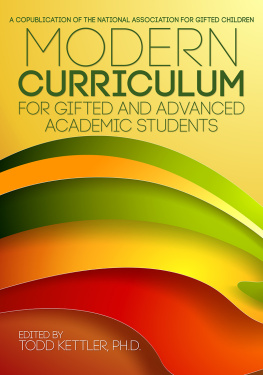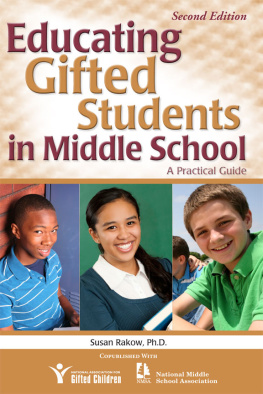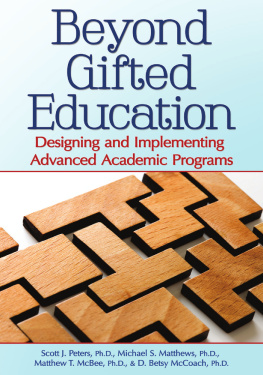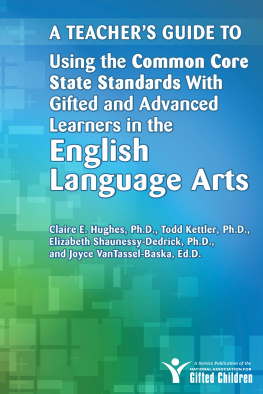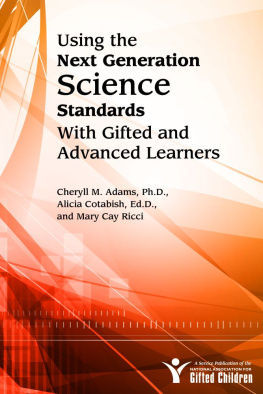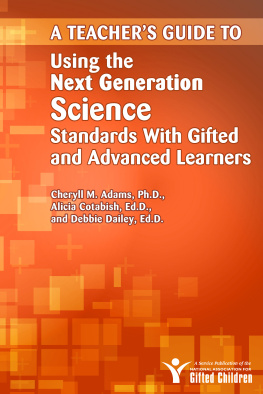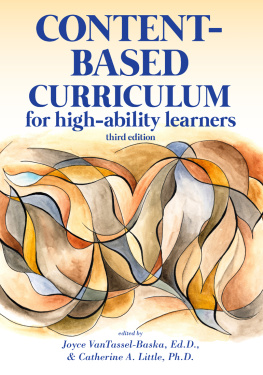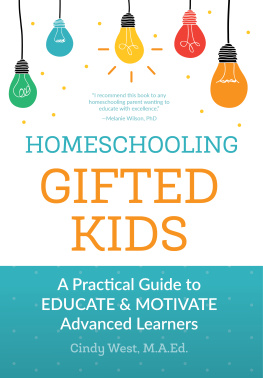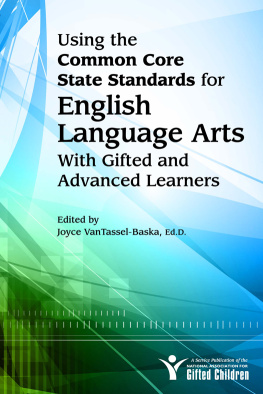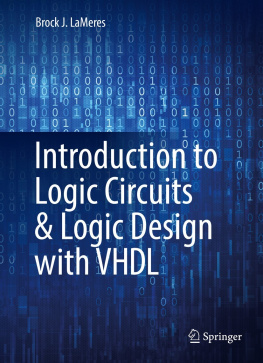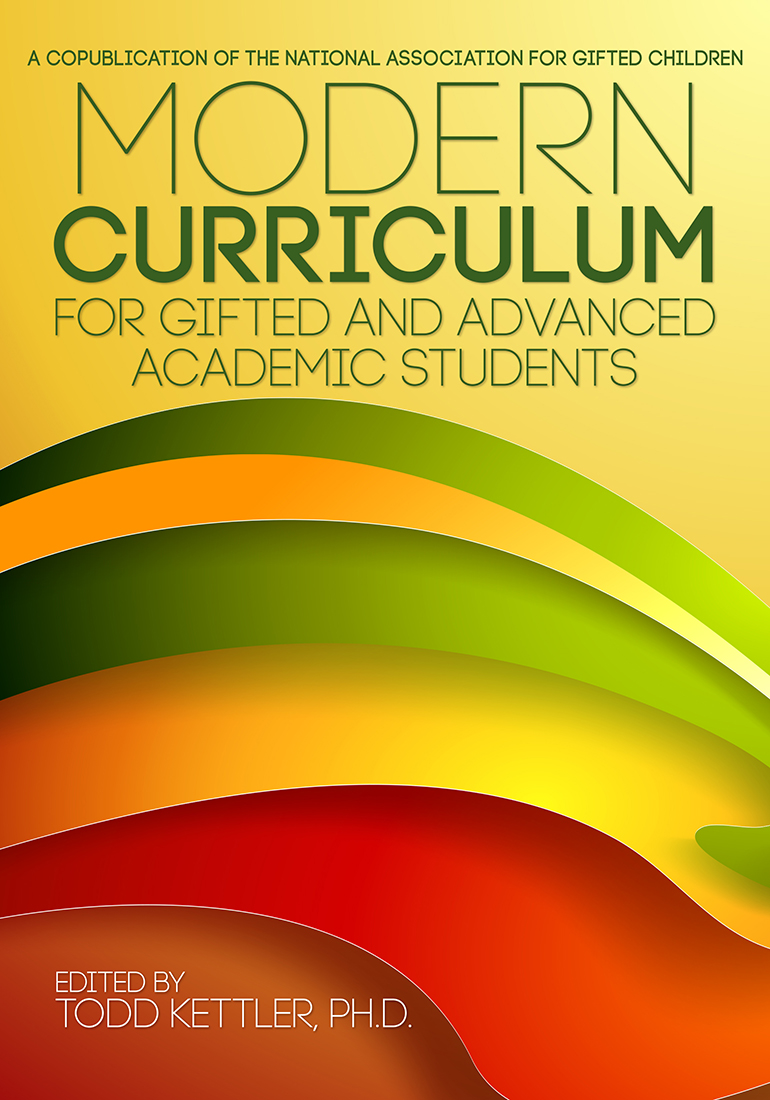


Library of Congress Cataloging-in-Publication Data
Modern curriculum for gifted and advanced academic students / edited by Todd Kettler, Ph.D.
1 online resource.
Description based on print version record and CIP data provided by publisher; resource not viewed.
ISBN 978-1-61821-474-4 (ebook) ISBN 978-1-61821-475-1 (epub) ISBN 978-1-61821-473-7 (pbk.)
1. Gifted children--Education--Curricula--United States. 2. Curriculum planning--United States. I. Kettler, Todd
LC3993.9
371.95--dc23
2015028451
Copyright 2016, Prufrock Press Inc.
Edited by Lacy Compton
Cover and layout design by Raquel Trevino
ISBN-13: 978-1-61821-475-1
No part of this book may be reproduced, translated, stored in a retrieval system, or transmitted, in any form or by any means, electronic, mechanical, photocopying, microfilming, recording, or otherwise, without written permission from the publisher.
At the time of this books publication, all facts and figures cited are the most current available. All telephone numbers, addresses, and websites URLs are accurate and active. All publications, organizations, websites, and other resources exist as described in the book, and all have been verified. The authors and Prufrock Press Inc. make no warranty or guarantee concerning the information and materials given out by organizations or content found at websites, and we are not responsible for any changes that occur after this books publication. If you find an error, please contact Prufrock Press Inc.

| Prufrock Press Inc.
P.O. Box 8813
Waco, TX 76714-8813
Phone: (800) 998-2208
Fax: (800) 240-0333
http://www.prufrock.com |
Table of Contents
Introduction
Bold Vision for Developing Talent in an Age of Standards
Introduction to Modern Curriculum for Gifted and Advanced Academic Students
TODD KETTLER
Gifted education hovers anxiously on the periphery of educational policy, practice, and priority. There are no federal mandates for gifted education programs and services. Only about half of the states at any given time have policies requiring gifted education, and in many of those, there are no evaluation and accountability mechanisms to incent quality. I have been a participant observer to this phenomenon as I spent 12 years as a director of gifted and advanced academic programs. At an administrative retreat, I once told my good friends and colleagues who were directors of language arts and mathematics that our jobs were very different. I pointed out that each day they come to work with the assumption that everyone supports curriculum and instruction efforts in language arts and mathematics. Sure, they had disagreements in the ranks, but no one questioned why students learn math, reading, and writing. I, on the other hand, dedicated half of my work to advocating to sustain existing efforts in gifted education with little time left for developing better and broader visions. Each staffing and budget meeting held the possibility of reductions to gifted education, even in a state that mandated we provide services.
Surely, the reasons for gifted educations peripheral role are complex. As a field, we do not systematically build a research base of curriculum and instructional interventions that demonstrate effectiveness as we ought to. But even that likely agreed-upon statement leads to further complexities. We debate the definitions of giftedness and suffer the consequences of inequities. We struggle to measure meaningful outcomes, and in many cases our program evaluations, if they exist at all, focus on what the adults are doing rather than how the students are achieving. Once I asked a superintendent of a very successful school district how he measured the quality of the gifted program, and in a joking manner, he replied, The number of parent complaints. While we both laughed a little, we also knew there was a sad truth to the statement.
What is a modern curriculum for gifted and advanced academic students, and why do we need it? It seems that gifted education is searching for a curriculum identity. I make this suggestion based on the following observations and experiences. First, I believe we have taken on a parasitic role in curriculum, and this may be linked to the emergence of differentiation movements in the 1980s. Policies and practices at that time led to increasingly diverse classrooms and a reduction in ability grouping in the wake of de-tracking. Gifted education seemed to carry the torch of differentiated instruction. Many of the fields best thinkers proposed strategies and techniques on how educators of gifted students could differentiate the standard school curriculum to meet the needs of gifted learners. In spite of some evidence that differentiation was far more discussed than actually implemented, this became the primary approach of many school districts to provide gifted education services. The evolution of differentiated instruction went beyond ability-based modifications to include increasingly suspect learning-style modifications and student choices in activities. By the end of the 20th century, it seemed differentiated instruction had become the instructional approach for all students and its biggest organizational advocate was the Association for Supervision and Curriculum Development (ASCD), rather than the National Association for Gifted Children (NAGC). Perhaps the present culmination of this parasitic status is the emergence of the Common Core State Standards (CCSS). Again, gifted educations role has been to articulate how to differentiate the standards for gifted learners. While we may not be satisfied with that role, it was better than the alternative, which was to succumb to those who said the CCSS standards may have eliminated the need for gifted education at all.
Second, we seem indecisive and apprehensive about the most popular advanced academic programs to have emerged in the last two decades. I have attended multiple College Board conferences and heard the statement that the Advanced Placement (AP) program is not gifted education. I have attended multiple International Baccalaureate (IB) conferences and heard the same statement about IB. Furthermore, I have been at gifted and talented conferences and heard advocates for gifted education say the same thingAP and IB are not gifted education. At the same time, I consult in and work with many school districts, some of which are among the most successful in their states. When I gather data on what the gifted students are doing in those middle and high schools, I find that they are for the most part participating in AP and IB programs. In a similar way, the third program that has grown tremendously is dual/concurrent enrollment in college courses. Again, many gifted education administrators claim it is not a gifted education program, but many gifted students seem to participate in early college enrollment in high schools of all sizes and locales. All three of these programs have grown tremendously in the last 20 years, and some researchers in gifted education have advocated for their merits with gifted students. However, these initiatives largely remain the purview of general education, not gifted education.
Next page
